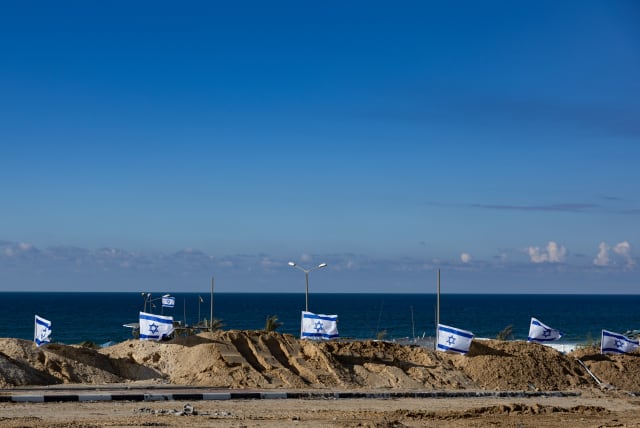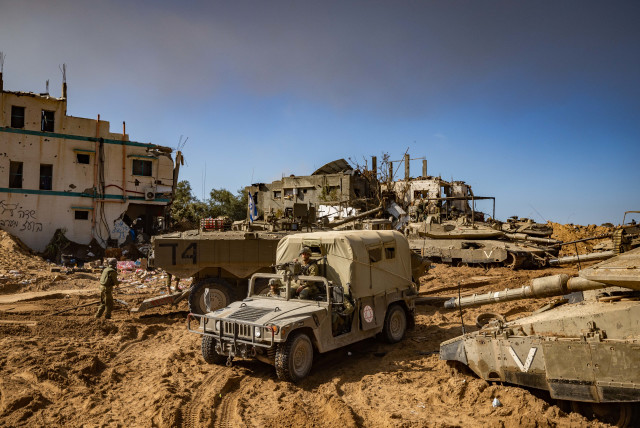Political and military maneuvers shape Israel’s strategy against Hamas

The Israeli government balances intense military operations in Gaza with internal political challenges and strong support from the United States.
The Israel-Hamas war that erupted on October 7 after Hamas’s terror attack and Israel’s vow to eradicate the terror group’s infrastructure is concluding its sixth week.
With over 360,000 reservists recruited by the Israeli Defense Forces, Israel is advancing in its operation in the Gaza Strip while protecting the tense northern border with Lebanon as well as, to some extent, with Syria; securing the West Bank area and Israeli airspace by intercepting rockets and missiles fired into Israeli territory from Gaza, Southern Lebanon, and sporadically from Yemen too.
Tensions in the north have risen lately but not enough to open an additional front to the war. Whether this front will be opened remains uncertain.
Shifa Hospital
The IDF entered Shifa Hospital on Wednesday after weeks of Israel's warnings of the fact that under Gaza's largest hospital, Hamas holds a terror base and its main center of command.
“During searches inside one of the hospital’s wards, the troops located a room containing unique technological means, combat equipment, and military equipment used by the Hamas terrorist organization,” the IDF said.
The troops are still searching the compound. Dr. Omer Dostri, researcher at the Jerusalem Institute for Strategy and Security and an expert on national security and military strategy, told The Media Line that the Israeli forces are cautious and are proceeding slowly and in a controlled manner.
“They systematically clear different areas of the compound above ground to eliminate terrorists before addressing the underground facilities,” he added.
Israel has found moderate amounts of military equipment inside the hospital. In an interview with the BBC, the IDF said that among the Hamas equipment found at the hospital, there is a laptop with pictures of those abducted on October 7.
Brig. Gen. (ret.) Dr. Meir Elran, senior researcher and director of the domestic research cluster of the Institute for National Security Studies at Tel Aviv University, says that Shifa Hospital has become a symbol for the press during the war, and in the same manner, it is a symbol for Hamas—and, consequently, for the IDF, too.
However, he tells The Media Line, “The amount of … force that Israel is putting into the intrusion into the hospital itself is quite limited,” as opposed to the perception created by the media.
The IDF’s success in penetrating Shifa Hospital, says Dostri, is primarily a psychological triumph. “Hamas believed that the IDF would be reluctant to enter and conduct military operations there due to international pressures on Israel,” he continued.
What’s next?
Yoav Gallant, Israel’s defense minister, said that Israel has cleared the Western Gaza City area and the “next phase of the operation” has begun.
The primary ground military efforts of the IDF are presently concentrated in the northern Gaza Strip. Dostri says that they focus on “encompassing the eradication and clearing of terrorist strongholds in Gaza City, including the intricate network of tunnels and bunkers, notably beneath Shifa Hospital.”
Once the IDF accomplishes its goals in the north, it plans to shift focus to the next area, anticipated to be the central region of Gaza. Adds Dostri, “Operations in the central Gaza Strip are expected to target military activities from Nuseirat Camp to Deir al-Balah,” he explained, adding that following the operations in central Gaza, the IDF intends to redirect the majority of ground activity to southern Gaza.
Hostage deal
Hamas currently holds at least 240 hostages it abducted during the October 7 incursion. Reuters reported on Wednesday, citing a Qatari source, that Hamas had agreed to release 50 hostages in exchange for three days of cease-fire.
Dostri says that such a break would afford Hamas the opportunity to regroup, enhance the morale of its operatives, and pose a threat to IDF forces within Gaza. That is why he believes that “Israel must avoid granting Hamas any respite from the ongoing conflict, especially a hiatus lasting several days.”
Moreover, he proceeded to say that a truce could undermine the motivation and momentum of the Israeli offensive, potentially inviting substantial international pressure against renewing the attack on Hamas.
Elran says that all these rumors are actually a mental game played by Hamas against the Israeli public. “Whatever numbers—20, 30, 50—are being thrown to the public, [it is] mostly psychological warfare. We think that the most important thing is to get all the hostages but instead of freeing all the hostages, they’re playing games and they are procrastinating on purpose. ... It has a great impact on Israel and they understand that. They understand that they are playing in order to make some psychological impact on Israel,” he asserted.
Israel’s internal politics
Yair Lapid, the opposition leader, called on Prime Minister Netanyahu to quit his post and let someone of his own party replace him so that there is no need for elections. “Netanyahu needs to go now during the fighting,” he said during an interview with Israeli TV Channel 12.
“This is a political game. There is an opposition, there is a coalition and unfortunately, also in times of war, they are playing the same game,” said Elran.
However, Elran adds that such political dynamics will not have an effect on the war, noting that this is not the major concentration in Israel currently. “Everybody has to be dedicated and focused on the most important thing on the agenda presently and this is how we win the war as quickly as possible, how we dismantle … Hamas as quickly as possible, how we bring the kidnapped hostages back as soon as possible,” he said.
Given the ongoing conflict, added Dostri, “There is currently no practical chance, and there are even no calls from the right-wing camp, to replace … Benjamin Netanyahu. Therefore, Lapid’s suggestion to replace Netanyahu with another Likud candidate is unlikely to materialize in the coming months.”
American support
Since the beginning of the war, the American leadership has shown great support for Israel and its mission to eradicate Hamas and all its terror infrastructure.
The American stance is clear, Elran asserted. “It is being expressed repeatedly by the American president. Israel should defend itself,” he said that, in addition to statements, America has been supporting Israel in a variety of remarkable ways and that he does not believe that this will change soon.
Despite the unconditional support, says Dostri, “The Biden Administration has emphasized the importance of preserving civilian lives in Gaza, facilitating the delivery of humanitarian aid, and considering a political solution for Gaza under Palestinian Authority control.”
Among the support offered by America, he continued, “the administration has consistently urged Israel to negotiate the release of abductees, particularly those with American and other foreign citizenship.”
Dostri believes the American leadership could face some pressure in this context. “As the conflict persists and Palestinian casualties rise, although most casualties are terrorists, the Biden Administration may face increasing pressure from European nations, segments of the American public, and progressive factions in Congress and the Senate,” he said.
Jerusalem Post Store
`; document.getElementById("linkPremium").innerHTML = cont; var divWithLink = document.getElementById("premium-link"); if (divWithLink !== null && divWithLink !== 'undefined') { divWithLink.style.border = "solid 1px #cb0f3e"; divWithLink.style.textAlign = "center"; divWithLink.style.marginBottom = "15px"; divWithLink.style.marginTop = "15px"; divWithLink.style.width = "100%"; divWithLink.style.backgroundColor = "#122952"; divWithLink.style.color = "#ffffff"; divWithLink.style.lineHeight = "1.5"; } } (function (v, i) { });

